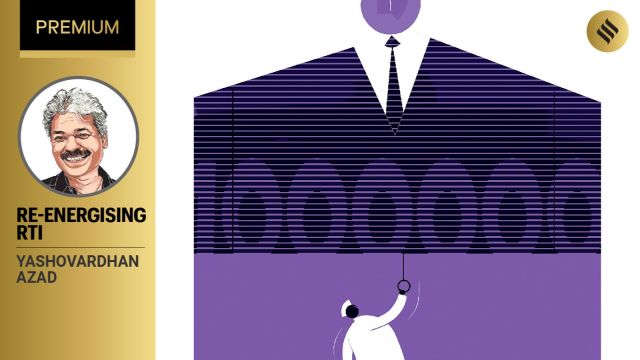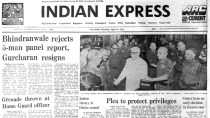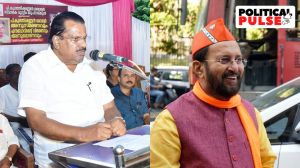- India
- International
SC decision on Electoral Bonds case: Will it revive the flagging RTI Act?
In its landmark judgment, SC averred that poll bond is violative of fundamental rights and infringement of RTI is unjustified for curbing black money. The two goals of the RTI Act — transparency and accountability — were clearly on the judges’ minds
 The SC weighed in in its favour under Article 19 (1) (a) of the Constitution as against informational privacy in the EB case. (File)
The SC weighed in in its favour under Article 19 (1) (a) of the Constitution as against informational privacy in the EB case. (File)The historic decision by the Supreme Court (SC) declaring Electoral Bonds (EB) scheme as unconstitutional has given a big boost to the flagging Right to Information Act. The SC weighed in in its favour under Article 19 (1) (a) of the Constitution as against informational privacy in the EB case. The Solicitor General (SG) arguing before the Court had stated that citizens had no right to donor or recipient identities; the finance minister had opined that political retribution was also a cause for denial of information. Earlier, a Central Information Commissioner (CIC) put the RTI Act on its head by giving a decision that information disclosure on EBs was not in public interest. Such judgments, while reflecting poorly on their quality, also hinted at the opacity of the regime.
It is in this context that the SC judgment is truly a landmark one. The SC averred that the voters’ right is breached by the anonymity clause and that information on political parties is essential. Poll bond, in fact, is violative of fundamental rights and infringement of RTI is not justified for curbing black money. The two goals of the RTI Act — transparency and accountability — were clearly on the judges’ minds while delivering this unanimous judgment.
Will the SC judgment put the RTI regime on the right track is a moot point. The year 2023 ended on a sombre note for the Act. Vacancies in Information Commissions, mounting pendency, delayed hearing of second appeals, perceptible opacity and the casual approach of officers in dealing with RTI queries were pointers of difficult days ahead. Three lakh twenty-one thousand appeals were pending before the various Commissions as of June 30, 2023. Satark Nagrik Sangathan in its recent study of State Information Commissions’ performances found that four out of 29 are defunct and at least three are still headless. In 10 commissions, the waiting time for hearing after filing an appeal is over a year. Nineteen of the 29 Commissions have not cared to file their annual report, mandatory under the Act. The CIC itself boasts of only three commissioners with eight vacant posts. At this rate, there is hardly any hope of clearing backlogs.
It was the filing of the first RTI query in Police station, Poona on October 12, 2005, that heralded the RTI era in India. The end of the first decade left clear indications that the RTI was a work in progress. Public authorities were still not geared to manage the growing demand for information. Repetitive questions for personal vendetta raised concerns. Compliance with the Commission’s orders saw delays in some cases while pendency increased. Probing queries on corruption led to the murder of many RTI activists.
The CIC faced its first major test after delivering a landmark judgment on June 3, 2013, bringing political parties under the ambit of the RTI Act. The ruling party and the Opposition baulked at its audacity. Advised by their legal luminaries, they neither complied nor appealed against the decision. The decision left a debilitating impact on the CIC. It could have at best fined the political party spokesman or an official Rs 25,000 and do little else to ensure compliance of its orders. It also signalled the beginning of a distrust between the Commission and the government. Today, its commissioners are shorn of their former status and fixity of tenures.

Reiterating the government’s stand on the issue, a decade later, in June this year, the SG argued before the SC that the CIC order cannot be used to seek a writ from the SC to bring political parties under the ambit of the RTI Act. Legally, the SG is right but what does a commoner do when the parties cleverly choose not to comply, nor appeal against the CIC order — this, while there is a compelling demand that political parties thriving on public money should be more open to public scrutiny?
While issues such as these and the PM Care Fund are of relatively recent era, even information of the preceding 20 years are held back on security grounds. The Henderson Papers are doomed to the archives and the correspondence between Roy Bucher, the second Army commander-in-chief and PM Nehru, resting in Nehru Memorial Library, is denied access to under the RTI Act because the Ministry of External Affairs feels that foreign relations would be impacted. Revelations of McNamara and Nixon’s observations on Indira Gandhi have not impacted our relations with the US nor the trenchant and acerbic comments of Churchill on India.
Things can still change around if the government displays its will to resurrect the RTI regime. Let a committee under the Minister of Personnel, comprising information commissioners, officials and even civil society members, examine issues and take appropriate measures. The Prime Minister has often stressed on transparency and accountability and that is exactly what the Preamble of the RTI Act embodies. The RTI Act was once called a sunshine legislation, rated as one of the best in the world and even emulated by a few nations.
It was in the early Nineties when the appeal of a catchy slogan in a cluster of villages in Rajasthan — “Hamara Paisa — Hamara Hisab”, coined by the Mazdoor Kisan Sangathan Samiti (MKSS) — resonated with other villages, townships and the portals of power in Jaipur. Access to government records on public expenditure in villages was a long-standing demand and it ushered in a mass movement, garnering support from all quarters. As replies started coming in from officials in village durbars, the MKSS, led by crusaders Aruna Roy and Nikhil Dey, scripted a historic win for “right to information” .
Today, the time has come when India boasting of a rising economy and moral and political clout should energise the RTI regime, which would only add heft to its position in the comity of nations. Let us hope that the SC judgment acts as a catalyst in strengthening the RTI Act and restoring it to its past glory.
The writer is chairman of DeepStrat, a former central information commissioner and a retired IPS officer who served as secretary, security, and special director, Intelligence Bureau. Views expressed are personal
EXPRESS OPINION
More Explained
Apr 26: Latest News
- 01
- 02
- 03
- 04
- 05











































